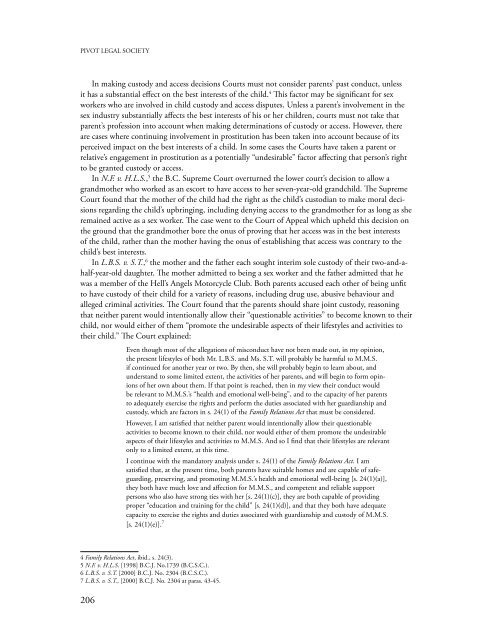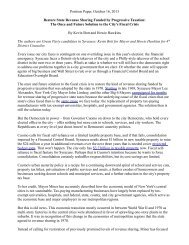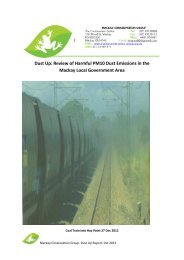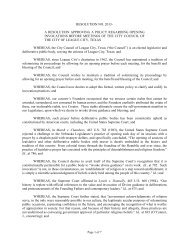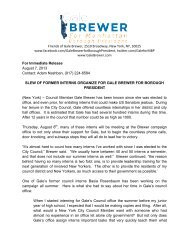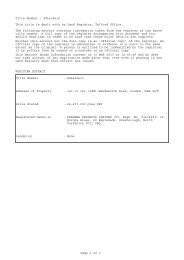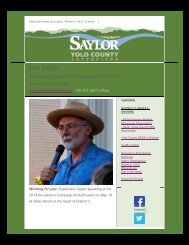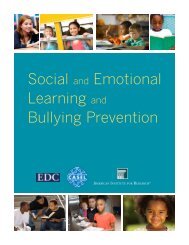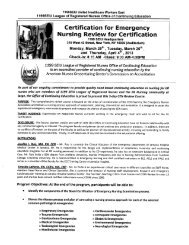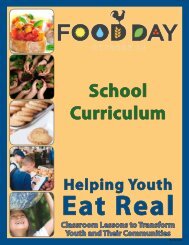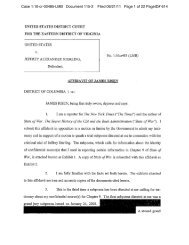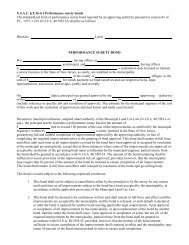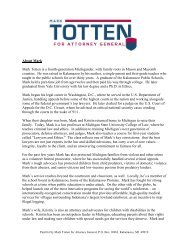Beyond Decriminalization: Sex-work, Human Rights and a New ...
Beyond Decriminalization: Sex-work, Human Rights and a New ...
Beyond Decriminalization: Sex-work, Human Rights and a New ...
- No tags were found...
You also want an ePaper? Increase the reach of your titles
YUMPU automatically turns print PDFs into web optimized ePapers that Google loves.
PIVOT LEGAL SOCIETYIn making custody <strong>and</strong> access decisions Courts must not consider parents’ past conduct, unlessit has a substantial effect on the best interests of the child. This factor may be significant for sex<strong>work</strong>ers who are involved in child custody <strong>and</strong> access disputes. Unless a parent’s involvement in thesex industry substantially affects the best interests of his or her children, courts must not take thatparent’s profession into account when making determinations of custody or access. However, thereare cases where continuing involvement in prostitution has been taken into account because of itsperceived impact on the best interests of a child. In some cases the Courts have taken a parent orrelative’s engagement in prostitution as a potentially “undesirable” factor affecting that person’s rightto be granted custody or access.In N.F. v. H.L.S., the B.C. Supreme Court overturned the lower court’s decision to allow agr<strong>and</strong>mother who <strong>work</strong>ed as an escort to have access to her seven-year-old gr<strong>and</strong>child. The SupremeCourt found that the mother of the child had the right as the child’s custodian to make moral decisionsregarding the child’s upbringing, including denying access to the gr<strong>and</strong>mother for as long as sheremained active as a sex <strong>work</strong>er. The case went to the Court of Appeal which upheld this decision onthe ground that the gr<strong>and</strong>mother bore the onus of proving that her access was in the best interestsof the child, rather than the mother having the onus of establishing that access was contrary to thechild’s best interests.In L.B.S. v. S.T., the mother <strong>and</strong> the father each sought interim sole custody of their two-<strong>and</strong>-ahalf-year-olddaughter. The mother admitted to being a sex <strong>work</strong>er <strong>and</strong> the father admitted that hewas a member of the Hell’s Angels Motorcycle Club. Both parents accused each other of being unfitto have custody of their child for a variety of reasons, including drug use, abusive behaviour <strong>and</strong>alleged criminal activities. The Court found that the parents should share joint custody, reasoningthat neither parent would intentionally allow their “questionable activities” to become known to theirchild, nor would either of them “promote the undesirable aspects of their lifestyles <strong>and</strong> activities totheir child.” The Court explained:Even though most of the allegations of misconduct have not been made out, in my opinion,the present lifestyles of both Mr. L.B.S. <strong>and</strong> Ms. S.T. will probably be harmful to M.M.S.if continued for another year or two. By then, she will probably begin to learn about, <strong>and</strong>underst<strong>and</strong> to some limited extent, the activities of her parents, <strong>and</strong> will begin to form opinionsof her own about them. If that point is reached, then in my view their conduct wouldbe relevant to M.M.S.’s “health <strong>and</strong> emotional well-being”, <strong>and</strong> to the capacity of her parentsto adequately exercise the rights <strong>and</strong> perform the duties associated with her guardianship <strong>and</strong>custody, which are factors in s. 24(1) of the Family Relations Act that must be considered.However, I am satisfied that neither parent would intentionally allow their questionableactivities to become known to their child, nor would either of them promote the undesirableaspects of their lifestyles <strong>and</strong> activities to M.M.S. And so I find that their lifestyles are relevantonly to a limited extent, at this time.I continue with the m<strong>and</strong>atory analysis under s. 24(1) of the Family Relations Act. I amsatisfied that, at the present time, both parents have suitable homes <strong>and</strong> are capable of safeguarding,preserving, <strong>and</strong> promoting M.M.S.’s health <strong>and</strong> emotional well-being [s. 24(1)(a)],they both have much love <strong>and</strong> affection for M.M.S., <strong>and</strong> competent <strong>and</strong> reliable supportpersons who also have strong ties with her [s. 24(1)(c)], they are both capable of providingproper “education <strong>and</strong> training for the child” [s. 24(1)(d)], <strong>and</strong> that they both have adequatecapacity to exercise the rights <strong>and</strong> duties associated with guardianship <strong>and</strong> custody of M.M.S.[s. 24(1)(e)]. Family Relations Act, ibid., s. 24(3). N.F. v. H.L.S. [1998] B.C.J. No.1739 (B.C.S.C.). L.B.S. v. S.T. [2000] B.C.J. No. 2304 (B.C.S.C.). L.B.S. v. S.T., [2000] B.C.J. No. 2304 at paras. 43-45.206


